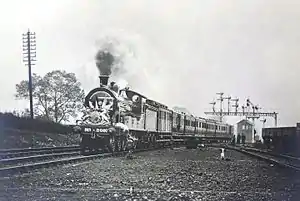NER Class S
The North Eastern Railway Class S (LNER Class B13) was a 4-6-0 type of steam locomotive designed for express passenger workings. The first example was built in 1899. They were very similar to the NER Class S1, except for the smaller wheels of the former.
| NER Class S LNER Class B13 | |||||||||||||||||||||||||||||||||||||||||||||||||||||||||||||||
|---|---|---|---|---|---|---|---|---|---|---|---|---|---|---|---|---|---|---|---|---|---|---|---|---|---|---|---|---|---|---|---|---|---|---|---|---|---|---|---|---|---|---|---|---|---|---|---|---|---|---|---|---|---|---|---|---|---|---|---|---|---|---|---|
 2010 with the Royal Train (Date and location unknown) | |||||||||||||||||||||||||||||||||||||||||||||||||||||||||||||||
| |||||||||||||||||||||||||||||||||||||||||||||||||||||||||||||||
| |||||||||||||||||||||||||||||||||||||||||||||||||||||||||||||||
| |||||||||||||||||||||||||||||||||||||||||||||||||||||||||||||||
| |||||||||||||||||||||||||||||||||||||||||||||||||||||||||||||||
Design
They were designed to reduce double heading on the East Coast Main Line. However they steamed poorly, with a smaller and shallower grate than was used even by other locomotives at the time (a problem which also affected the B14s and later, the B15s), and the 4-4-0s of the NER Class R quickly replaced them, with the 4-4-2 layout being preferred for later express passenger designs. The class were re-classified as London and North Eastern Railway Class B13 in 1923.
Modifications
The first seven locomotives had slide valves, while the remainder had piston valves. The slide valve engines were later fitted with piston valves. Schmidt superheaters were fitted between 1913 and 1925.[2]
Numbering
| NER No. | Date built | Date superheated | Date withdrawn | Notes |
|---|---|---|---|---|
| 2001 | Jun 1899 | Feb 1916 | Jun 1931 | |
| 2002 | Jun 1899 | Jul 1924 | Jul 1931 | |
| 2003 | Sep 1899 | May 1920 | Jul 1931 | |
| 2004 | Dec 1899 | Apr 1921 | Aug 1928 | |
| 2005 | Dec 1899 | Nov 1916 | Nov 1928 | |
| 2006 | Dec 1899 | Apr 1918 | Jun 1931 | |
| 2007 | Mar 1900 | Jun 1916 | Oct 1928 | |
| 2008 | May 1900 | Apr 1917 | Dec 1929 | |
| 2009 | Jun 1900 | Jul 1915 | Jul 1931 | |
| 2010 | Jun 1900 | Apr 1916 | Jul 1931 | |
| 726 | Apr 1906 | Nov 1915 | Dec 1936 | |
| 740 | Apr 1906 | Jul 1914 | Sep 1932 | |
| 757 | Apr 1906 | Mar 1918 | May 1932 | |
| 760 | May 1906 | Apr 1915 | Mar 1931 | |
| 761 | Jun 1906 | Nov 1924 | Sep 1934 | Transferred to service stock September 1934; superheater removed; renumbered 1699 October 1946; retired May 1951. |
| 763 | Jun 1906 | Jan 1916 | Apr 1929 | |
| 766 | Jun 1906 | Dec 1916 | Oct 1931 | |
| 768 | Jun 1906 | Aug 1918 | May 1929 | |
| 775 | Aug 1906 | Dec 1920 | Aug 1936 | |
| 1077 | Aug 1906 | Jun 1918 | Nov 1931 | |
| 738 | Jun 1908 | Aug 1916 | Jul 1938 | |
| 739 | Jun 1908 | Feb 1925 | Jul 1932 | |
| 741 | Jun 1908 | May 1917 | Jan 1930 | |
| 743 | Jul 1908 | Oct 1917 | May 1932 | |
| 744 | Jul 1908 | Nov 1915 | Dec 1931 | |
| 745 | Aug 1908 | Dec 1921 | Dec 1931 | |
| 746 | Aug 1908 | Mar 1918 | Nov 1931 | |
| 747 | Sep 1908 | Oct 1920 | Aug 1932 | |
| 748 | Sep 1908 | Mar 1915 | Oct 1938 | |
| 749 | Oct 1908 | Nov 1915 | Apr 1930 | |
| 750 | Nov 1908 | Jan 1915 | Nov 1932 | |
| 751 | Nov 1908 | Nov 1913 | May 1936 | |
| 752 | Nov 1908 | Mar 1920 | Jun 1934 | |
| 753 | Dec 1908 | Nov 1916 | Oct 1938 | |
| 754 | Jan 1909 | Jul 1922 | Dec 1936 | |
| 755 | Jan 1909 | Aug 1917 | Feb 1934 | |
| 756 | Jan 1909 | Nov 1919 | Sep 1934 | |
| 758 | Feb 1909 | Nov 1915 | May 1930 | |
| 759 | Mar 1909 | Sep 1923 | Oct 1938 | |
| 762 | Mar 1909 | Jun 1917 | May 1937 |
Withdrawal
They were withdrawn between 1928 and 1938.
References
- Boddy et al. 1975, p. 68.
- "The Worsdell Class B13 (NER Class S) 4-6-0s". LNER Encyclopedia.
- Boddy et al. 1975, p. 73.
- "NER/LNER Worsdell "B13" Class 4-6-0". BRDatabase.
- Boddy, M. G.; Brown, W. A.; Fry, E. V.; Hennigan, W.; Hoole, Ken; Manners, F.; Neve, E.; Platt, E. N. T.; Proud, P.; Yeadon, W. B. (March 1975). Fry, E. V. (ed.). Locomotives of the L.N.E.R., Part 2B: Tender Engines—Classes B1 to B19. Lincoln: RCTS. ISBN 0-901115-73-8.